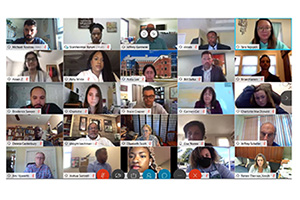- Apply
- Visit
- Request Info
- Give



Published on August 21, 2020

More than 100 members of the Eastern community attended a virtual town hall meeting on Aug. 20 on racism and social justice in the aftermath of the police-related death of George Floyd. In line with the national dialogue concerning systemic racism, the university-wide discussion was co-sponsored by the Multicultural Leadership Council (MLC) and Eastern’s administration to focus on making Eastern a more inclusive campus. The meeting was the second of its kind this summer; the first was held in June.
“We know that not everyone in our community feels safe, respected and supported,” said President Elsa Núñez in her opening comments. “That’s why we’re meeting — so we can change that. It’s not enough just to talk. I encourage everyone to find ways for us to change the culture of our campus.”
Senior Tara Nguyen, president of the Asian Cultural society, presented the three calls to action that resulted from the town hall meeting in June. University administrators provided updates on each of them. In response to the call for Eastern to work with outside organizations to address the effects of racism-related trauma, Dean of Students Michelle Delaney indicated that her staff has undergone a variety of sessions and workshops on racial trauma in the past two months and will continue to work in this area.
The second call to action was for the University to consider creating a citizen’s review board of students, faculty and staff to review police activities. Police Chief Jeffrey Garewski said the department is in the process of developing an advisory committee, rather than a review board, and has already begun to identify student and staff committee members.
The third call to action was for the University to implement mandatory training for faculty, staff and students on the topics of explicit and implicit bias, diversity, racial discrimination, hate crimes and the consequences of these acts. Director of Housing and Residential Life Lamar Coleman announced the fall 2020 launch of a platform that will be focused on diversity, equity and inclusion.
“The platform will help students to understand implicit bias and inclusion objectives with regard to race, sexuality and other topics,” said Coleman. “In addition to educating students, we’ll be able capture their thoughts, opinions and perspectives going into the program.”
The Aug. 20 meeting agenda also reviewed three additional calls to action presented by the MLC, including increasing mental health resources for students of color, hiring Black police officers, and hiring faculty of color and teaching more Black history courses on campus.
Junior Alyssa Lawrence, vice president of the student chapter of the NAACP, presented the call concerning mental health resources. Director of Counseling Services Bryce Crapser said Eastern continues to offer free counseling services to students and is happy to facilitate access to counselors of color, highlighting members of Eastern’s counseling services staff as well as nearby clinicians.
“If Black students don’t feel comfortable coming to us, we’ve compiled a list of nearby Black mental health professionals, and we’re happy to help out with referrals,” he said, indicating that there are several such agencies and clinicians within walking distance of campus.
Senior Charlotte Pacheco-Sahagun, public relations officer for Freedom at Eastern, presented the call on hiring Black police officers. Vice President of Equity and Diversity Stacey Close outlined Eastern’s history of employing police officers of color, while acknowledging the current lack of such officers on campus. Chief Garewski said he wants more officers of color in the department but described several challenges to recruitment and retention, including a small pool of candidates and young officers who leave for other departments.
“I’m always disappointed when I see a pool with no candidates of color,” said Garewski, but added, “I will never put a police officer on this department if they can’t work with this community.”
On the topic of hiring diverse faculty, Provost Bill Salka said his goal is to build the most talented and diverse faculty as possible, noting that Eastern has the most diverse faculty among all higher education institutions in Connecticut, public or private. “I believe we have strong policies, but there’s room to improve.”
Vice President Close indicated that 30.5 percent of all teaching faculty at Eastern are people of color, and that Eastern puts in a great deal of effort to hire and retain these professors and lecturers. “We nurture them with resources and provide opportunities for research and conferences so they may qualify for tenured positions.”
Written by Michael Rouleau